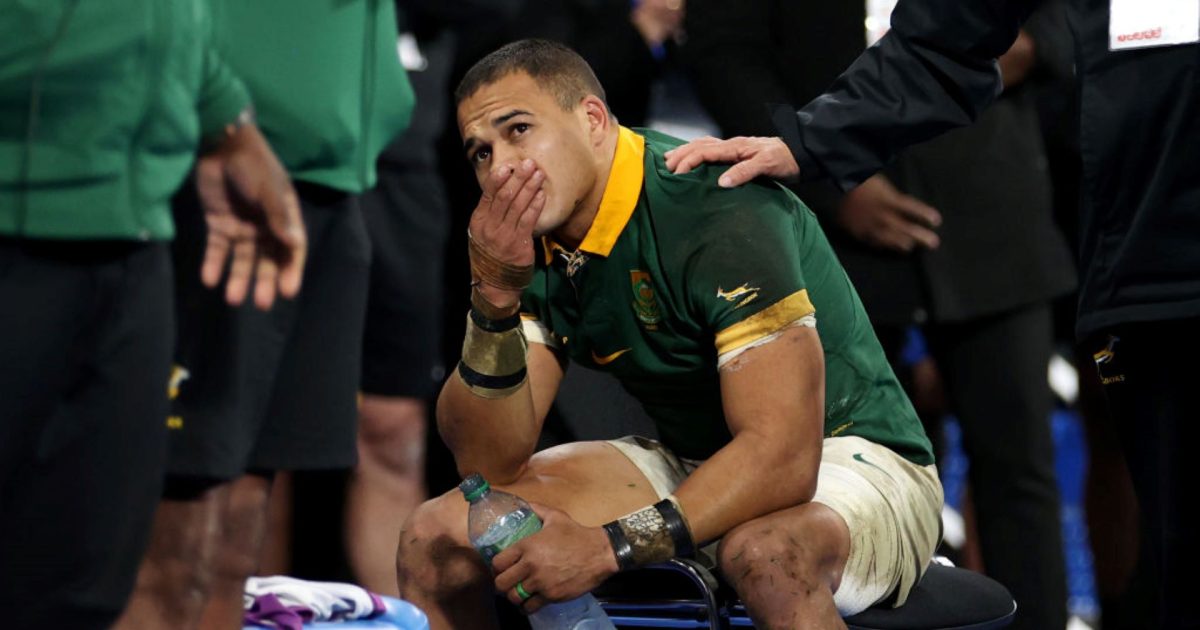Cheslin Kolbe reveals what went through his mind during World Cup final yellow card

Cheslin Kolbe is a man with unwavering faith and it certainly came in handy during those agonising minutes in the closing stages of the World Cup Final at Stade de France in Paris.
The Bok superstar, who was shown a yellow card for a deliberate knock-on in the 73rd minute against the All Blacks, could barely watch as his teammates hung on grimly to secure a 12-11 win while he was sitting on the sidelines.
Cameras spotted the 30-year-old pulling his jersey over his head and he eventually turned his back on the action as it all became a bit too much for him.
“Receiving a yellow card in the World Cup Final is disappointing,” Kolbe told reporters during a visit to Kraaifontein in Cape Town where he grew up.
“I was more disappointed because I let the whole nation down.
“I let my teammates down at the time.
“Looking up at the clock knowing that I was not going back on the field, I just went and sat on the chair. I pulled the jersey over my head and I was crying and praying at the same time.
“I was asking God that if this was meant for us he would pull us through in the end.
“I think that was God’s plan for me and his calling for me, which was not to finish the game even though I would have loved to.
“I think his calling for me was to go out for the last eight to 10 minutes.
“I firmly believe that was where God wanted me to be at that stage.
“To be honest with you, I didn’t hear the final whistle blow.
“One of the management staff came up to me and pulled me and that’s when I knew we won the World Cup and we were taking gold back to South Africa.
“It was a moment of complete relief.
“We know what it [the victory] does and how it unites our country and how important the victory would be for South Africa.
“It brings people together.
“I think that is what we need and hopefully we can continue with that and it doesn’t die out.”
Kolbe was accompanied by his wife Layla as he visited two schools in his hometown, one of which was his alma mater, Simonsberg Primary.
The special bond between the two was there for all to see as they inspired the next generation and Kolbe believes family played a huge role in the Springboks’ success in France and even in Japan four years earlier.
“The first thing they [Jacques Nienaber and Rassie Erasmus] said was that the culture needs to change and they created an environment where it doesn’t matter where you come from,” Kolbe explained.
“You can be yourself and others can learn from you as well.
“I think the defining point in both World Cups and the reason why we won was because they opened the Springbok door to the families.
“They allowed the families to stay with us throughout the whole World Cup.
“Speaking to some of the other players [in other teams], they didn’t have that luxury of having their families there. Maybe they could for five to 10 days or they had specific days.
“Knowing that our families are there with us after a hard day of training does bring a bit of calmness and it is refreshing.
“It can be overwhelming at times for other players because they don’t have families there, but everybody bought into it. That was very special.
“For them [family] to just share that moment and seeing how everything works was incredible.
“Yes, we sacrifice a lot but our families sacrifice way more than us. A lot of people don’t know that. They don’t know what our families go through and we as players take our hats off for what they do and how they overcome challenges at times.”





























